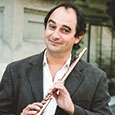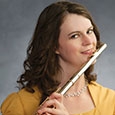French flutist Nicolas Duchamp shares his insights into the French School of flute playing. Previously he taught at the Conservatoire Gustave Charpentier and was principal flutist of the National Opera Comique. He now lives and teaches in New York City. He regularly presents concerts featuring the music of Philippe Gaubert (1879-1941) played on the Louis Lot Gaubert flute (1886).
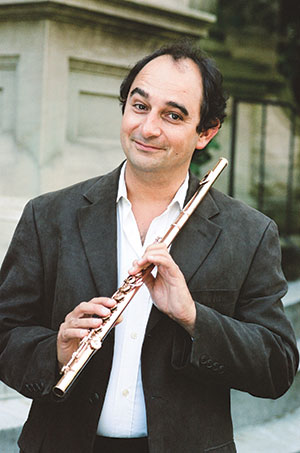
What were your early flute studies like?
Starting an instrument with a good teacher when you are young is essential for your basics, for your self-confidence on the instrument, and for your eventual development as a teacher. During my youth, I was very fortunate to have access to a good teacher. My paternal grandmother, an opera singer, taught me from the time I was three: how to read, how to listen, and how to sing. She told me about the composers, and I knew how to read music before I could read words. Because I declared that I wanted to be a musician, she also taught me unforgettable concepts for my career. For instance, I learned to be patient and to persevere in learning. She drilled into me that I would have to practice for hours every day of my entire professional life. She was my first teacher.
In the 1980s in France, you could not start flute lessons before the age of twelve. I knew I wanted to become a flutist at age three, after hearing a Rampal performance. At twelve, when I was accepted by the Bordeaux Conservatory, I went wild on the flute. Apparently, everything on the instrument worked naturally for me.
My second teacher, Stephane Boudot, was principal flutist in the National Bordeaux Orchestra. He taught me the fundamentals to become a flutist. He was an extraordinary flute player trained in the direct French tradition in Bordeaux, which was Jules and Paul Taffanel’s city. Flute is in the Bordelaise blood. Monsieur Boudot felt that teaching a student like me who said “I have no choice; I must be a flutist or nothing” was a serious challenge. As a consequence, he was extremely demanding with me. He would say, “You are gifted but you know nothing. And it is not because you are gifted that you will be a good professional musician. You will need a serious education. We will see.” Our relationship was sometimes confrontational. I was playing four or five hours a day but I didn’t practice. I just wanted to play. He always reminded me about the level I would need to reach even to be just an ordinary flutist.
The Bordeaux Conservatory is a music school whose mission is to form possible professional musicians. The studies are pretty complete and structured in ten progressive grades for about ten years. Music theory, chamber music, instrument, music history, and harmony were a part of this curriculum. Since there are age limits to be able to audition for one of the two elites, Superior Music Conservatory in Paris and Lyon, you need to start early and follow the requirements every year. It is a lot of pressure, but it is useful preparation for a professional musician’s life. Then I graduated from three National Music Schools where I focused more on the orchestral audition repertoire, developing the necessary rigor for a professional orchestral life. I have been extremely fortunate to study with flutists who were also highly skilled musicians. The psychological aspect of long-term playing was always an important matter. The recurring question was (and is still): do you know what you are doing in terms of style and musicality? Are your technical skills and musical understanding appropriate to develop a long-term musical and instrumental life?
After Stephane Boudot, I studied with Maurice Pruvot and Georges Alirol from the Orchestre de Paris as well as Jean Pierre Rampal, Maxence Larrieu, Robert Thuilliez, Catherine Cantin, and Michel Debost on a less regular basis. They were all highly experienced with strong personalities. After being given enough of a foundation first, these teachers really helped me become a more mature musician and flutist.
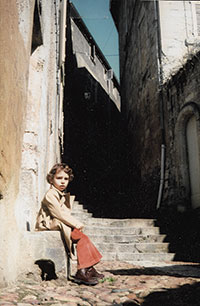
Did you like to practice?
I liked playing the flute for as much time as I could when I was kid. It took me a long time to realize I had to study and not only play. Everything came easily for me on the flute, so I could not understand why I had to really practice at that time. Maurice Pruvot – who was more musically oriented than technical – once deliberately asked me to play a scale. I got in a panic! He looked at me without saying anything. Finally he said, “And you want to be a musician? I think this is probably a joke!” I was so upset that I started to practice scales more than the other students and became a scales specialist. This short lesson put my playing on track for a long time.
Did you have lessons with Michel Debost?
I was not a regular student of his but I participated in many of his classes and had some lessons at his home. Michel Debost was an extraordinary flute teacher. He synthesized the instrument like nobody else. In a minute, he could provide an accurate, detailed diagnostic of your flute playing. As a fabulous flute doctor for students, his various bits of advice are still present in my daily professional life. His deep reflection on the instrument opened my mind to understand clearly my daily flute needs. Today I am very happy to share with students all over the world a little of what he helped me to understand.
What were your first experiences as a professional musician?
I performed Cecile Chaminade’s Concertino with my school orchestra in Munich, Germany, at the Olympia Halle when I was 16 in front of 12,000 people. I was terrified, but I learned a lot about how to face an audience.
When did you decide to become an orchestral performer?
I wanted to become an orchestral musician from the time I started the flute. As I listened to music for hours in my bedroom, I dreamt of being a part of what I listened to, playing the great symphonic repertory. I was fascinated by the orchestral sound mass, color, and various expressions. I also wanted to imitate my teacher who was an orchestral player.
What would you say defines the French School of flute playing?
To have an idea of what the French School of flute playing is, I think it is necessary to understand the cultural and geographic facts that influenced this approach to the instrument, especially from 1850 to 1960. After that time the French school started to become more international with Jean-Pierre Rampal’s approach. He took advantage of recordings, TV, and traveling opportunities to make the flute popular. He considered the flute to be part of the king solo instruments like the violin, piano, or cello. France is a small country with micro-cultural diversity, and it has also been a highly-developed center for free-thinking intellectuals and philosophers for centuries.
The flute became an important tradition in France due to a variety of factors, including the founding in 1795 of the Conservatoire de Paris, one of the best music schools in the world, and then a revival impulse there under Gabriel Fauré in 1911. In the late 1800s the Boehm system was exploited by Louis Lot, a genius of the modern flute in Normandy. The development of French technique is completely connected with the many different creative initiatives in composition. The variety in music compositions led to a variety of flute approaches. For example, to perform Debussy’s music, flutists had to develop a large number of sound techniques, while they required something else again for Poulenc, Jolivet, Messiaen, or Ravel. In every case, French flute music is technically demanding.
French flute playing also advanced due to the very developed musical institutions all over the country that are free of charge. When young students start to learn an instrument in France, they receive structure on that instrument for years. That makes their execution clear, and with a strong basis in various instrumental techniques. Finally, under the impulse of some great teachers like Taffanel and Gaubert – who were not only flutists, but composers and conductors – the French School of flute playing is based on a broad, traditional knowledge of music.
What are your favorite etude books? How many etudes do you require the student to bring in each week?
I have two etude books that I know from memory: Boehm 24 Caprices, Op. 26 and the slow Etudes modernes by Paul Jeanjean. Etudes are fundamental for students. I would recommend two to three etudes a week for those who want to build a deep knowledge of the instrument as a future professional player. They help to develop an ability to practice in a quick and efficient way. They also help with sightreading, understanding specific musical processes, and creating the necessary quick physical reflexes. Etudes are too often neglected during the study of the flute. However, there is a deep feeling of satisfaction as your playing becomes stable, controlled, and easier because you spend daily time practicing them.
What do you listen for when auditioning a prospective student?
I check to see if he has motivation and if he can develop himself – if he is open to it. Some students just want you to say they are super. I don’t think that way. I am not judgmental at all, and in that situation, I ask myself: Can this student be receptive to what I have to offer? Can he be patient, motivated and resilient enough?
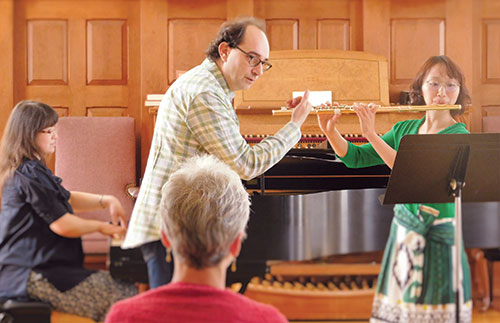
How are students today different from when you were a student?
For those who have a profound talent – and those who have the opportunity of education, social, familial, and financial support to engage themselves on the long and arduous path of becoming a professional musician – it is no different. Today, a majority of students have access to social media, which is a positive trend in itself, but the disparity of the musical content can create confusion and poor modeling. Teachers have a crucial responsibility to guide students through these overwhelming sources of information.
Do you encourage your students to become flute performance majors?
This job requires a combination of qualities and good opportunities. If you think that you want to be either a musician or a lawyer, then be a lawyer and make music for yourself. If you think that the only choice you have is to make music, then think about it again and be honest with yourself about your abilities. Be sure to seek the advice of a serious, experienced teacher.
My advice to students is to love, have passion, be strong, and stay receptive. Find your own internal balance in life as much as possible. Make choices and follow them with a realistic knowledge of the requirements of a professional musician’s life. Also, find your own understanding yourself as much as possible, instead of imitating other flutists.
What should students know about preparing for an audition?
It is a long and specific process. Be sure you know and understand what you absolutely need to be a great orchestral musician. Various and precise sound attacks, sound homogeneity, tone flexibility, rhythmic exactitude, logic, knowledge of the other parts, great capacity to focus and a healthy mental attitude.
Do you have management?
I have management in Japan and I am surrounded by people who help to maintain and develop my solo career. You cannot have a significant solo career without any help or support. It can be from your orchestral position, a good manager, someone who believes in you, or financial support from various organizations or people.
What is your weekly schedule like?
I divide my professional time between recitals, travel, personal practice, and students. I try to balance all of these aspects. I skype with students when I can’t teach them live.
To maintain the level of playing I want performing is not enough. I must maintain technical skills by daily practicing exercises. I play Reichert, Taffanel et Gaubert, and Tassinari, mostly. Other exercises are more research for me. Through exercises you achieve a better understanding of the music – its style, form, and sound, and you improve your ability to make music come together mentally, physically, and emotionally. The place where you practice is the laboratory; a stage is where you face the reality of your level and share it with an audience.
What style of music do you focus on?
I do not specialize in only one style since I have to perform many kinds of repertoire for solo recitals. However, I know the French repertoire well and do a lot of research on it. I perform a lot of recitals of French music on Philippe Gaubert’s flute (Louis Lot: number 1986, made in 1874). That is unique, and I am working to bring out more authenticity in French music during the recitals. Based on extensive research on his archives since 2010, I have started to reorganize the Gaubert archives with his family in Paris. I have learned a great deal from his original manuscripts with his notes regarding style. Reading his correspondence with some of the greatest French creators and hours of conversation with his stepdaughter, Yvette Poiret Gaubert, has helped me to deeply understand the French style. After more than 250 recitals of French repertoire and making the Gaubert Vivant! documentary, I feel this music in my blood. I am happy to help many students from all over the world get better at this not-so-easy music.
Do you record yourself playing often?
No. I believe more in developing the way one listens to one’s self. Internal hearing is important. External hearing is important as well because you need to play the instrument with a consideration for the acoustics and sound projection in various spaces. That is the reality for a concert player. I recorded a couple of solo CDs, but never in an acoustic studio. I recorded two full versions and chose the best takes from each. I think that makes it more lifelike. Each performance situation needs a different approach. Also, if you do not have professional equipment to record yourself, sound frequency will not be reproduced accurately.
What kind of music do you listen to?
I am kind of eclectic with my music choices. I want to have the largest possible knowledge of music and am always curious to discover new pieces. I think of myself mainly as a beginner in music. My approach is non-judgmental. I let the music come to me and try to understand how it works structurally and stylistically. I want to understand which techniques the composer used to express his intentions. I am also interested in listening to live and recorded concerts by soloists, mostly on the violin, cello, and piano. Purely for fun, my romantic side is fed by Puccini operas and Brahms chamber music. Schoenberg’s first period is a part of my life as well.
Who are your role models?
Conductors who dedicate their entire life to connecting musical structure with sound balance through physical and gestural technique are, in my opinion, fundamental to work with or observe. Solo instrumentalists such as violinists, cellists, and pianists capture all of my attention as well. Their extended repertoire is, for a dedicated musician, a major source of musical knowledge. Those instruments are extremely demanding. Painters and philosophers are also a source of reflection for me, as well as some psychiatrists.
What are your professional goals?
I want to bring new heights to my flute playing and understand the instrument in its most intricate parts. I try to transmit to students the great tradition of the art of French flute playing at its highest level. I am planning to make a historic recording of the Gaubert flute repertoire, playing on his own flute. I want to preserve and develop French flute playing throughout the U.S.
***
Behind the teeth and/or in between the lips depending on tempo and intensity.
What is the difference between tonguing and articulation?
Articulation is related to a musical matter; tonguing is the way you realize it.
What are your thoughts about vibrato?
Vibrato should be the result of a well-placed, free sound. It is supposed to reflect your personal feeling in a natural matter first. It has to be a part of the complete sound and not something you are using to compensate for a lack of musical understanding.
What are your thoughts about breathing?
Breathing is a representation of life. Don’t forget that there are two circular steps to take care of. In terms of air, regarding the dynamics or the musical intensity: what you need, how fast you blow, and with what air pressure, is something to consider for a good calibration of sound production.
What do you suggest for aligning and balancing the flute?
This is a fundamental point. An incorrect alignment can affect sound production and create muscular tension. Basically, the headjoint should be in line with the first key with small adjustments with regard for your specific morphology. The sound should be naturally responsive and your fingers free of any muscular tension. The balance of the instrument comes from three points. One is from the left hand for stability on the jaw, while two are from the right hand for a natural horizontality.
How do you switch from playing in a concert hall to a recording studio?
The approach is totally different. In a concert hall you speak to an audience with the characteristics of the specific space and its acoustics, and you must bring something from within. For a studio recording session you are dealing with a microphone. It is less emotional, and it is more like being a surgeon.
What are your thoughts on developing projection?
Most of the time this can be confusing. Sound projection is necessary but not only in a loud way. Don’t forget that a flute does not sound like a trombone. Respect the nature of your instrument first. Then, it becomes more about how to use the natural resonators of your body. Musical energy and gravity are also important.
How do you teach phrasing?
While some people seem to have a natural understanding of how to approach a musical phrase, it is important to be able to identify the structure of a phrase based on chords, style and articulations. This is essential to playing at a mature musical level.
* * *
Nicolas Duchamp is an internationally known performer and teacher. For many years he served as principal flutist for the National Opera Comique in Paris as well as being a soloist and chamber and orchestral musician with many orchestras. He has taught at the Conservatoire Gustave Charpentier as the assistant to Jean Ferrandis. He regularly presents masterclasses throughout the United States, Canada, Japan and France. In 2009, Duchamp created the concert and film homage GAUBERT VIVANT! honoring the life and work of Philippe Gaubert (1874-1941) at the request of Gaubert’s family. He has resided in the United States since 2013.
